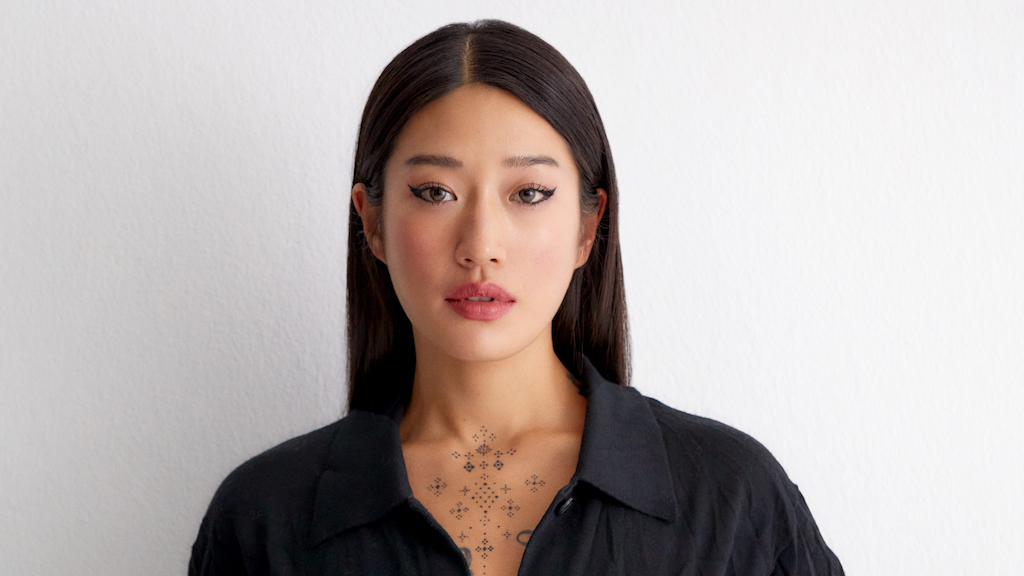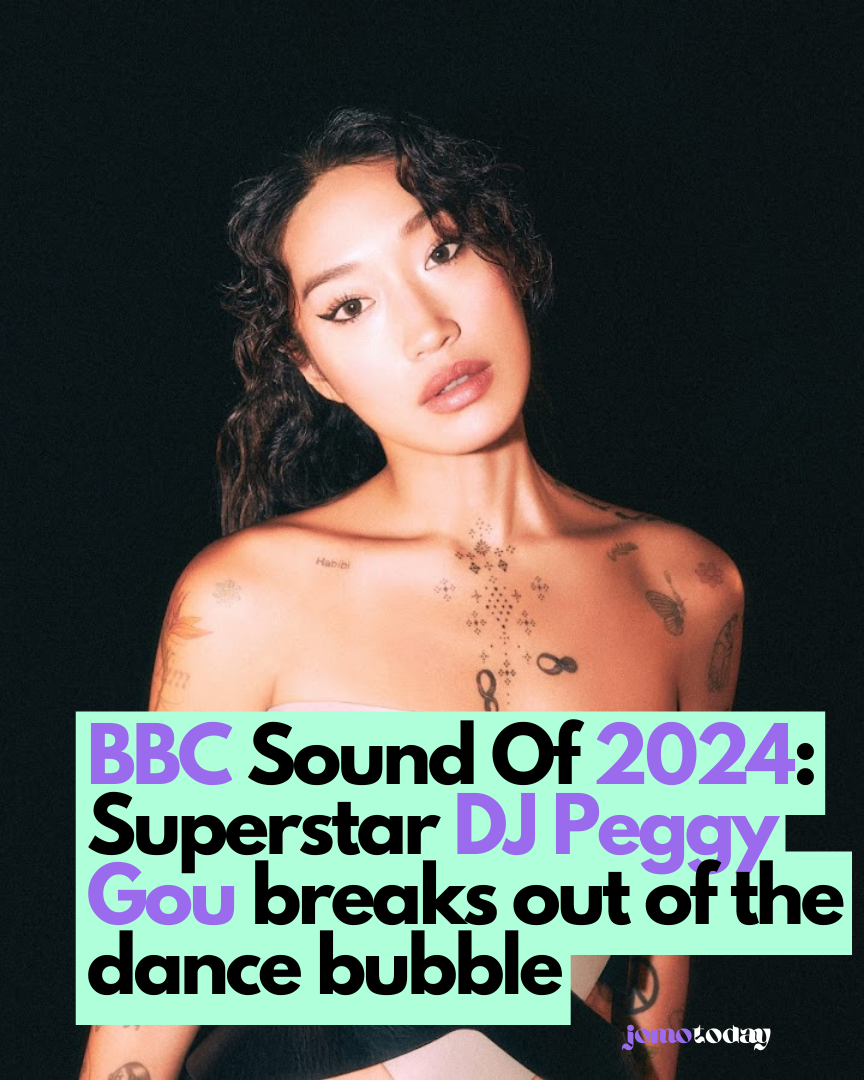Korean DJ Peggy Gou breaks into mainstream success, ranking third in Radio 1’s Sound of 2024. Her club sound gains widespread popularity, propelling her beyond the dance bubble.

As her club sound goes overground, the Korean-born musician Peggy Gou comes third in Radio 1’s Sound of 2024.
Peggy Gou, a DJ of Korean origin based in Berlin, has been a fixture in the house music scene for years. However, she experienced a significant shift last summer with the release of the catchy pop track “It Goes Like (Nanana),” which propelled her into mainstream recognition.
“Even though I’ve been putting out music since 2015, last year was a game-changer,” she reflects. “I never anticipated this song would receive such overwhelming love, but it truly transformed a lot for me.”
Following the song’s chart success, Gou found herself on the cover of Vogue, crowned as the top house DJ globally, and collaborating with Lenny Kravitz. Furthermore, she’s just been honored with the third spot on BBC Radio 1’s Sound Of 2024 list, renowned for predicting breakout stars of the upcoming year.
“I’m beyond grateful,” she expresses during a Zoom call from Dubai. “I want to extend my thanks to everyone who supported and voted for me!”
Her inclusion on the list is somewhat unexpected. Since its inception in 2003, the Sound Of poll has celebrated newcomers, from the inaugural winner 50 Cent to notable names like Franz Ferdinand, Adele, James Blake, Stormzy, and PinkPantheress.
It’s remarkable as no other nominee has been eight years into their career, signaling Gou’s potential to transcend the confines of the dance music sphere.
She’s noticed a distinct shift in perception. “Previously, people recognized me before my music. But post ‘Nanana,’ I feel like my music is being heard without any preconceived notions of what I look like. That’s a significant change.”
The music stands on its own, emanating brightness, melody, and an irresistible beat that easily captivates a wide audience.
Renowned producer Todd Terry describes her take on house music as more than a genre—it embodies an entire emotion.
Her goal is clear: “I aim to infuse people with incredible energy. Decades from now, I want them to recall, ‘Remember that track? Remember that instant?’ and reminisce about the emotions and experiences it evoked when they first heard it.”
Peggy Gou, born Kim Min-ji in 1991 and raised in Incheon, South Korea’s main seaport, initially developed a passion for music through K-pop. Her admiration wasn’t for the contemporary sounds of groups like Stray Kids or BTS but for the 80s icons such as Kim Wan-sun and Uhm Jung-hwa, often referred to as “the Korean Madonna.”
Reflecting on that era, she remarks, “If I listen back to it now, it’s still good. It has a sexy and cheerful vibe to it.”
Her true musical journey commenced at 14 when her parents sent her to London to learn English. Despite not speaking the language initially, she courageously embarked on this journey armed with dictionaries. Living with guardians as a minor for three years, Peggy embraced a more carefree attitude, even obtaining a fake ID and spending weekends exploring London’s club scene.
Jokingly recalling her time, she says, “I don’t know if you’re familiar with Croydon, but that’s where I lived. I was a bit of a wild girl!”
Returning to Korea at 18, Peggy felt constrained by the environment and swiftly enrolled at the London College of Fashion, finding her way back to the UK.
“In Korea, I struggled to keep up with the academic side, to be honest,” she admits. “But being in the UK felt like where I belonged. I felt more open-minded, whereas Korea, at that time, felt too conservative for me.”
Her dedication to studying took a backseat to her passion for nightlife. She frequented dance spots six nights a week, immersing herself in hip-hop venues and underground clubs. Her love for deep house, with its blend of R&B vibes, sparked in 2011.
Prior to this, she had grasped the fundamentals of beat-matching from a friend. When a DJ dropped out of a Korean society event at her university, Gou volunteered to fill in. Despite making several mistakes during the show, she managed to keep the crowd dancing.
This initial experience ignited her passion. As word of her talent spread, she began receiving bookings for university events and eventually secured a weekly residency at the Book Club in east London.
Although she didn’t succeed in her fashion course, she found employment at Harper’s Bazaar. Her ambition led her to Germany in 2016, where she had a singular goal: to become the first Korean woman to perform at Berghain, Berlin’s prestigious nightclub.
Remarkably, within a year, she accomplished her objective.
Gou delved into producing original songs for her DJ sets after a lengthy phase of crafting and discarding her own material spanning four years.
Initially, her early demos leaned heavily on samples, incorporating club beats with traditional Korean instruments. However, she found these compositions somewhat monotonous, leading her to disclose that despite this, she eventually released one of these early tracks, “Hungboo,” as part of her DJ-Kicks compilation.
Around 2016, she unveiled four EPs showcasing fluid yet potent house tracks. But it wasn’t until she pursued a more minimalist, vocal-driven approach that her work truly began to coalesce.
Her standout creation became “It Makes You Forget (Itgehane),” a melodic representation of dawn set to music—comprising swirling synths, subtly bubbling acid bass, atop a skipping house rhythm.
This track served as her debut attempt at singing, an adventurous move for her. Initially hesitant about singing in Korean, she eventually embraced it, feeling that her nationality should be reflected in her music.
While her smooth, ethereal vocals might surprise Westerners accustomed to the punchy, rap-infused style of K-Pop, Gou elucidates that the Korean language offers a rich palette of tones and textures.
In contrast to the hit-driven nature of K-Pop, her focus lies on poetic lyrics and the nuanced sounds of words. She prioritizes how each line ends, whether with an “ay,” “ah,” or “oh.”
Acknowledging feedback from her vocal trainer, she recognizes her singing style as more breathy and less staccato, setting her apart from the typical K-Pop cadence.
Peggy Gou experienced a surge in her career after the massive success of “It Makes You Forget (Itgehane)” in 2018, leading to a packed schedule with gigs across the globe, including notable performances at Glastonbury. Despite her initial unawareness about the festival’s significance, the crowd’s reaction to her set, marked by people waving their shoes and chanting her name, left a lasting impression.
While the acclaim was exciting, the relentless pace of being an international DJ started to wear her down. Gou began jotting down her feelings during travels as a way to remember them. In 2019, a stark moment in an airport restroom mirror made her realize her exhaustion, prompting a simple note: “I look exhausted.”
It wasn’t until the onset of the Covid pandemic that Gou found a chance to pause. With shows on hold, she delved into 80s and 90s music, finding solace in its simplicity and uplifting vibes. This period inspired her to create a song, “I Go,” drawing from the spirited innocence of 90s dance tunes to lift her spirits during tough times.
The phrase “I Go” not only signifies “I’ll keep moving” in English but also reflects a sound made by elderly Koreans when in pain or tired. Gou found this dual meaning fitting, enjoying words in Korean that resonate in English as well.
Gou openly acknowledges her perfectionist nature, insisting on achieving 100% satisfaction before releasing any song. This meticulous approach might explain the eight-year preparation period for her forthcoming debut album.
Expected to drop this year, the album will showcase tracks like “It Goes Like (Nanana)” and her latest single, “I Believe In Love Again,” a collaboration with Lenny Kravitz.
Remaining tight-lipped about the album’s content, Gou assures fans that it won’t be confined to just dance music. She teases, “There are certain elements that will diverge from my previous work.”
Stepping into the spotlight, she hints at a potential shift from her popular DJ sets to more traditional concert performances, cryptically sharing, “Why not? I believe that’s everyone’s aspiration.”
Read More: ‘Topping the charts has turned my life upside down’, Jamie Duffy






1 Comment